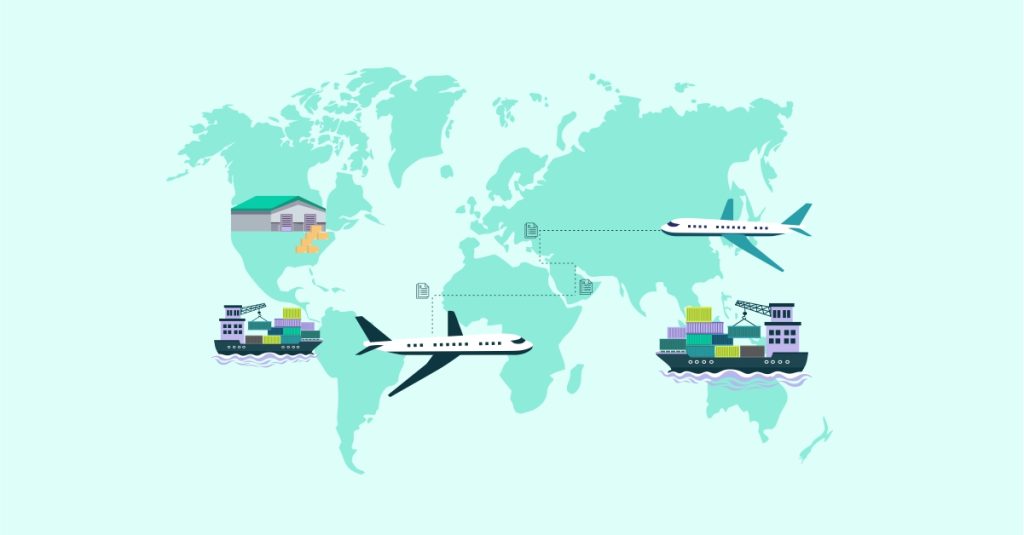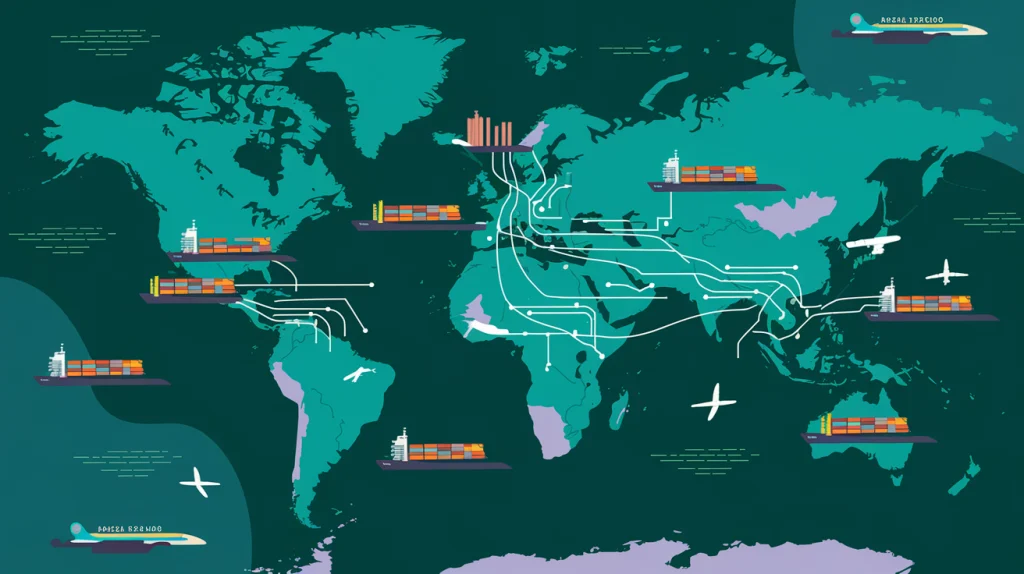The Impact of Geopolitical Events on Global Supply Chains
The global nature of modern commerce connects businesses to a complex network of supply chains. While this network offers many benefits, it also makes businesses vulnerable to geopolitical instability. Recent events, like the war in Ukraine, rising tensions in the South China Sea, trade wars, and pandemics, show just how much these geopolitical issues can disrupt supply chains. These disruptions include port closures, sanctions, trade restrictions, higher transportation costs, and delays, which all affect businesses’ bottom lines and their ability to serve customers. Understanding these disruptions and proactively implementing risk management strategies is crucial for building resilient supply chains.
Understanding Geopolitical Risks
Mitigating supply chain disruptions requires a thorough understanding of the specific geopolitical risks at play. These risks can be categorized into several key areas:
- Trade Wars and Protectionism: Tariffs, quotas, and other protectionist measures can significantly disrupt trade flows, impacting both the cost and availability of goods. The ongoing US-China trade war serves as a prime example of how such policies can create uncertainty and volatility in global markets.
- Sanctions and Embargoes: Sanctions imposed on specific countries or entities can restrict access to crucial markets and suppliers. The sanctions against Russia following its invasion of Ukraine have had a cascading effect on global energy and commodity markets.
- Political Instability and Conflict: Political unrest, armed conflicts, and terrorism can severely disrupt supply chains by impacting transportation routes, manufacturing operations, and the overall business environment. The recent conflict in Israel and Gaza is a stark reminder of how quickly geopolitical events can escalate and disrupt regional and global trade.
- Pandemics and Health Crises: The COVID-19 pandemic exposed the fragility of global supply chains to unexpected health crises. Border closures, lockdowns, and labor shortages led to widespread disruptions and highlighted the need for robust contingency planning.

These risks manifest in supply chains in a variety of ways. Delays and disruptions are common, as shipments can be held up or completely halted because of port closures, trade restrictions, or transportation issues. For example, when the Yantian port in Shenzhen, China, was closed due to COVID-19 lockdowns, it resulted in significant shipping delays for many industries around the world. The ripple effects of these delays spread across supply chains, leading to missed deadlines, congested ports, and dissatisfied customers.
Another major issue is the increase in costs. Tariffs, higher shipping fees, and the need to reroute shipments can cause the cost of goods to skyrocket. For instance, the tariffs introduced during the US-China trade war included significant duties on key products such as steel, aluminum, and a wide range of electronics. These tariffs led to increased costs for raw materials and finished goods, forcing companies to either absorb these costs or pass them on to consumers. The added expense of rerouting shipments through less efficient routes also places a financial burden on businesses, often affecting their profitability.
Supplier instability is another serious challenge. Political instability or sanctions can make it difficult, if not impossible, for suppliers to operate effectively, leading to shortages and production halts. For example, sanctions on Russia disrupted not only energy supplies like oil and natural gas, which are vital for many industries, but also affected key commodities such as aluminum, nickel, and grains. This created severe bottlenecks, particularly in the automotive and food industries, which rely heavily on these raw materials. As a result, manufacturers faced production slowdowns and were often forced to find alternative, more expensive suppliers, impacting the overall efficiency and cost of the supply chain.
Capacity constraints can also significantly affect supply chains, especially during periods of heightened geopolitical tension. Shortages of shipping containers, limited warehouse space, and insufficient trucking capacity can make it difficult for businesses to move their goods efficiently. During the height of the pandemic, there was a severe shortage of shipping containers, which drove up costs and delayed shipments worldwide. This shortage was worsened by increased demand and congestion at key ports, demonstrating how fragile supply chains can be when capacity is strained.
Political Dynamics and Global Economic Implications
Political tensions often have significant economic implications, creating ripple effects that can be hard to predict across global supply networks. Even minor political actions can have unexpected and far-reaching consequences. For example, trade barriers like tariffs increase the cost of imported goods, impacting consumer prices and potentially triggering retaliatory measures from other countries, which in turn can escalate the situation. Sanctions can also restrict access to essential resources, which disrupts manufacturing processes and creates shortages.
The increasing interdependence of global economies means that disruptions in one region can quickly spread to others, like a domino effect, causing a cascade of unforeseen challenges in other areas. This unpredictability highlights the need for international cooperation and more diversified supply chains. The impact of the US-China trade disputes on global technology supply chains serves as a clear example of how political dynamics can create ripple effects that affect industries across the globe, leading to shortages, production delays, and increased costs.
Supplier Relationships and Crisis Management
Building strong relationships with suppliers is crucial for navigating geopolitical uncertainty. Diversifying sourcing strategies and developing alternative supplier relationships can help mitigate the impact of disruptions. Establishing clear communication channels and developing joint crisis management plans with key suppliers can facilitate swift and coordinated responses to unexpected events. This includes having contingency plans in place for alternative sourcing options, rerouting shipments, and managing inventory levels.
Impacts on Supply Chain Operations
Geopolitical events create immediate and long-term operational challenges for businesses. Transportation routes can be disrupted, leading to increased transit times and higher freight costs. Customs delays and increased border security measures can further complicate logistics operations.
The semiconductor supply crisis during the escalation of tensions around Taiwan showed how geopolitical tensions in one region can ripple across multiple industries. Taiwan is a major hub for semiconductor manufacturing, and when tensions rose, it created uncertainty about the availability of these critical components.
This impacted not just the technology sector but also automotive, healthcare, and consumer electronics industries, which all rely heavily on semiconductors for production. The chain effect was evident as companies faced production delays, increased costs, and the need to source alternative, often less efficient, suppliers.
Businesses must be prepared to adapt quickly to such changing conditions by adjusting their logistics strategies and exploring alternative transportation options. For example, shifting from ocean freight to air freight or utilizing different ports of entry can help mitigate disruptions. Additionally, adjusting shipment dates and optimizing final-delivery methods, such as utilizing domestic trucking from alternative ports, can be essential for maintaining operational continuity.
Supply Chain Resilience and Flexibility
Flexibility is paramount in building supply chain resilience. Real-time risk forecasting and monitoring tools are critical in helping businesses anticipate potential disruptions before they occur. These tools use data from various sources—including weather reports, political news, port congestion statistics, and even social media—to provide insights into emerging risks. By combining this data, predictive models can identify trends and issue early warnings for possible disruptions.
For example, if political tensions are rising in a region that is a key transit hub, these tools can alert businesses to prepare contingency plans, such as rerouting shipments or adjusting inventory levels. Real-time monitoring also helps businesses track shipments as they move through the supply chain, identifying delays or other issues immediately, allowing for quick response. The use of machine learning and artificial intelligence in these systems has further enhanced their predictive power, allowing businesses to get ahead of potential issues rather than simply reacting to them. Investing in such technology that enhances supply chain visibility and enables agile decision-making is essential for navigating geopolitical uncertainty. This includes utilizing predictive analytics to identify potential risks, tracking shipments in real-time to monitor for delays, and automating key processes to improve efficiency and responsiveness.
Recognizing Early Warning Signs of Disruption
Early detection of potential disruptions is crucial for minimizing their impact. Monitoring key indicators, such as changes in supplier communication, financial instability in key regions, and local news reports, can provide valuable insights into emerging geopolitical risks.
Top 5 Key Performance Indicators (KPIs) to Monitor
- Supplier Lead Times: Measuring how long it takes for suppliers to deliver goods can help identify potential issues before they escalate. If lead times start to increase unexpectedly, it could signal instability or problems in the supply chain.
- Transportation Reliability: Tracking the consistency of transportation services can provide insight into logistics reliability. Delays in shipping or a decrease in reliability can indicate emerging problems that need immediate attention.
- Inventory Turnover Rate: This KPI shows how efficiently inventory is being managed. A slower turnover rate might indicate supply chain disruptions, overstock issues, or reduced demand, all of which require strategic adjustments.
- Demand Forecast Accuracy: Monitoring the accuracy of demand forecasts helps companies understand how well they are anticipating market needs. Poor accuracy could indicate changes in market conditions or upcoming disruptions that need addressing.
- Risk Event Frequency: Keeping track of how often risk events (e.g., supplier delays, transportation issues, geopolitical incidents) occur can help in identifying patterns and preparing for similar future events. A rise in the frequency of such events could signal an increased need for proactive measures.
These KPIs help in assessing where vulnerabilities exist and in responding quickly to minimize disruption. For example, the escalating tensions preceding the Russia-Ukraine conflict provided early warning signs for businesses with operations in the region. Recognizing these signals enabled companies to reroute logistics, diversify their supplier base, and manage inventory more effectively to mitigate the impact of the subsequent sanctions and disruptions.
Another example is the Red Sea attacks, which have affected the Suez Canal—a critical waterway between East and West. In response to these threats, some shipping companies have altered routes and increased security measures to reduce risks. This has been crucial in maintaining trade flows and minimizing potential disruptions.
The ongoing Israel-Hamas conflict is another case that may soon impact global trade. Companies in the energy and technology sectors are closely monitoring the situation and preparing contingency plans, including identifying alternative suppliers and adjusting production schedules, to avoid major setbacks in their supply chains.

Strategies for Diversification and Risk Mitigation
Diversification is a cornerstone of effective risk management. Reducing dependence on single suppliers and establishing relationships with suppliers in multiple regions can minimize the impact of disruptions in any one location. Developing strategic partnerships with logistics providers that offer global reach and flexible solutions can further enhance supply chain resilience. Investing in technology that supports supply chain visibility and risk assessment can help businesses identify vulnerabilities and implement appropriate mitigation strategies.
Partnering with companies like Unicargo, which offer integrated logistics solutions encompassing freight forwarding, warehousing, and trucking, provides a significant advantage. Unicargo’s global presence across three continents, combined with its digital platform, offers the flexibility and real-time visibility necessary to navigate geopolitical surprises effectively.
Case Studies of Recent Geopolitical Disruptions
Examining real-world case studies can provide valuable lessons in managing geopolitical risks. For instance, the Russia-Ukraine conflict highlighted how sudden geopolitical shocks can expose vulnerabilities in global supply chains. A key lesson learned here is the importance of maintaining diversified suppliers to avoid heavy reliance on any one region, thereby reducing risk during sudden disruptions.
The sanctions imposed on Russia also taught businesses about the need for contingency planning for critical resources. Industries impacted by energy and commodity restrictions realized the value of having alternative energy sources and flexible supplier agreements to mitigate the effects of geopolitical disruptions.
Similarly, the US-China trade war underscored the unpredictability of trade policies and their impact on supply chain stability. Businesses learned to stay agile by investing in technology to track changes in regulations and rapidly adjusting sourcing strategies. These experiences illustrate the importance of maintaining a flexible supply chain strategy, investing in visibility tools, and building partnerships with reliable logistics providers to enhance resilience.
The Importance of a Trusted Logistics Partner: Unicargo’s Role in Mitigating Geopolitical Risks
In today’s complex and volatile geopolitical landscape, partnering with a reliable logistics provider like Unicargo is essential for mitigating supply chain disruption risks.
Global Reach and Flexibility
Unicargo’s expansive global network provides businesses with access to a broad range of logistics solutions across three continents. This extensive reach ensures that businesses can shift or reroute operations quickly in response to unexpected disruptions, reducing the risk of dependence on a single region.
Personalized, Tailor-Made Solutions
We offer personalized and tailor-made logistics solutions, understanding that each business has unique needs. Unicargo’s adaptable approach helps create specific plans that align with business goals. This level of customization is key in ensuring operational continuity, even in highly volatile conditions.
Warehousing and PO Management
Our global warehousing capabilities and Purchase Order (PO) management services are designed to support diversified sourcing strategies and optimal inventory levels. This allows businesses to react swiftly to disruptions by balancing inventory between regions and ensuring that stock levels are always maintained effectively, mitigating the risk of stockouts or overstock situations.
Real-Time Visibility and Risk Management
Unicargo’s online platform offers real-time visibility into every aspect of the supply chain, from booking to delivery. This visibility is crucial for anticipating potential risks and managing them proactively. The platform’s predictive tools help identify disruptions early, providing businesses with ample time to adjust routes, manage inventory, or shift resources.
Customer Service and Expertise
Lastly, Unicargo’s comprehensive suite of services, paired with our global expertise and dedication to customer service, ensures that businesses have a trusted partner by their side. Our experience in navigating customs, compliance, and geopolitical challenges allows companies to focus on their core operations while we handle the intricacies of logistics. This partnership significantly reduces the complexity of supply chain management and builds long-term resilience against disruptions.
Overall, Unicargo is not just a logistics provider; we are a strategic partner dedicated to helping businesses maintain resilient and adaptable supply chains in an uncertain world.
Future Trends and Predictions for Global Supply Chains
Geopolitical tensions are likely to persist, shaping the future of global supply chains. Several key trends are emerging:
- Regionalization and Nearshoring: Businesses are increasingly looking to diversify their sourcing strategies by shifting production closer to home or to friendly geopolitical allies. This trend reduces reliance on long, complex supply chains that are vulnerable to geopolitical disruptions.
- Technology Investment: Investment in AI, machine learning, and data analytics is enabling businesses to improve supply chain visibility, predict potential risks, and optimize decision-making.
- Inventory Management Strategies: The shift from just-in-time to just-in-case inventory management is becoming more prevalent as businesses seek to buffer against potential disruptions. Holding higher levels of safety stock can help mitigate the impact of shortages and delays. Periodic inventory analyses and actions are paramount to staying healthy and steady.
Conclusion: Preparing for an Uncertain Geopolitical Landscape
In an increasingly interconnected world, geopolitical events will continue to pose significant challenges to global supply chains. Businesses must adopt proactive strategies to mitigate these risks and build resilience. Diversification is key—diversifying sourcing, investing in technology, and developing robust crisis management plans are critical components of an effective strategy. Partnering with a trusted logistics provider like Unicargo can further strengthen your resilience by providing tailored solutions and expert guidance. To learn more about how Unicargo’s services can enable your business to thrive despite global challenges, feel free to reach out and explore the specific ways we can support your supply chain needs.


